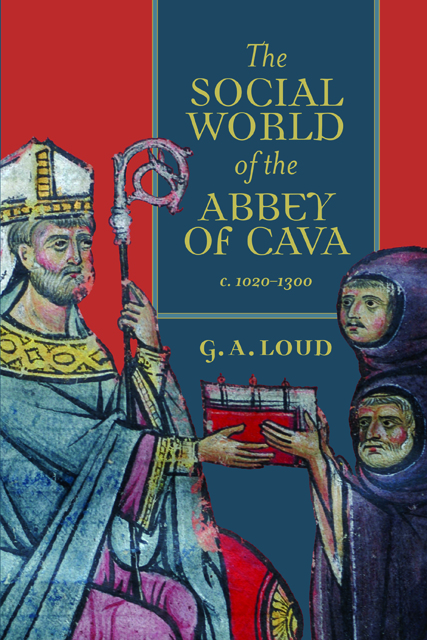Book contents
- Frontmatter
- Dedication
- Contents
- List of Maps and Charts
- Acknowledgements
- List of Abbreviations
- Note on the Organisation and Publication of the Cava Archive
- Dates
- Currency, Weights and Measures
- The Abbots of Cava, c. 1020-1300
- Maps
- I The Family of Vivus Vicecomes
- Introduction
- Part I The Abbey of Cava
- Part II Society and Economy
- Conclusions
- Appendix: Purchase and Expenditure by the Abbey of Cava, at Selected Periods between 1175 and 1230
- Bibliography
- Index
- Other volumes in Studies in the History of Medieval Religion
- Frontmatter
- Dedication
- Contents
- List of Maps and Charts
- Acknowledgements
- List of Abbreviations
- Note on the Organisation and Publication of the Cava Archive
- Dates
- Currency, Weights and Measures
- The Abbots of Cava, c. 1020-1300
- Maps
- I The Family of Vivus Vicecomes
- Introduction
- Part I The Abbey of Cava
- Part II Society and Economy
- Conclusions
- Appendix: Purchase and Expenditure by the Abbey of Cava, at Selected Periods between 1175 and 1230
- Bibliography
- Index
- Other volumes in Studies in the History of Medieval Religion
Summary
The extensive landholdings of the abbey of Cava came to form a significant territorial lordship, but simply to describe this as an abbatial seigneury without some qualification is misleading. The abbots of Cava never exercised the same degree of lordship as their counterparts at Montecassino. Nor, unlike the Terra Sancti Benedicti, or the lands of St Vincent on Volturno before the Norman Conquest, did the Cava lands comprise an extensive and coherent bloc of territory around the monastery. The Cava lands were built up piecemeal, the area around the abbey covered by its original privilege of immunity from Guaimar III was small, and only in Cilento did it possess really extensive swathes of territory. Even there other landowners, notably the S. Severino family, had adjacent holdings interspersing those of the abbey. While Montecassino had some twenty fortified villages (castella) on the Terra Sancti Benedicti by the mid-eleventh century, Cava acquired only two, S. Adiutore and Castellabate, although open villages (casales) developed around many of the Cava dependencies, both in Cilento and in Apulia. And while the abbey of Cava had some sort of military following, this is most unlikely to have been on anywhere near the same scale as Montecassino, which in the mid-twelfth century was assessed for the service of 60 knights and 200 sergeants for the royal magna expeditio. To assess the nature and impact of Cava’s lordship three principal aspects will be examined here: the immunity of the abbey and its lands from obligations to secular authority, the extent to which it exercised justice over its dependents, and how far it exercised lordship over higher-status vassals – or at least those who were more than simply peasants. The economic burdens which were placed upon its peasants will be considered in the next chapter.
The Immunity
The privilege granted by Guaimar III in March 1025 granted the abbey freedom from all public burdens and dues, as well as rights to water and wood, but it referred only to the very limited area immediately around the fledgling monastery, which was all that it then possessed. Nor was the concession to Cava in any way a unique mark of favour.
- Type
- Chapter
- Information
- The Social World of the Abbey of Cava, c. 1020-1300 , pp. 273 - 291Publisher: Boydell & BrewerPrint publication year: 2021

